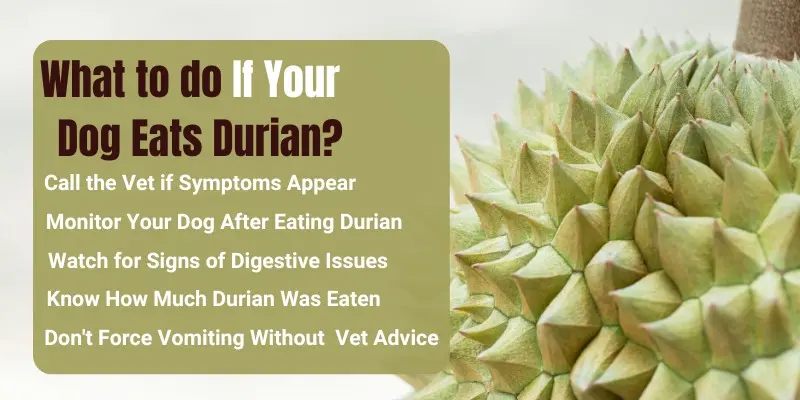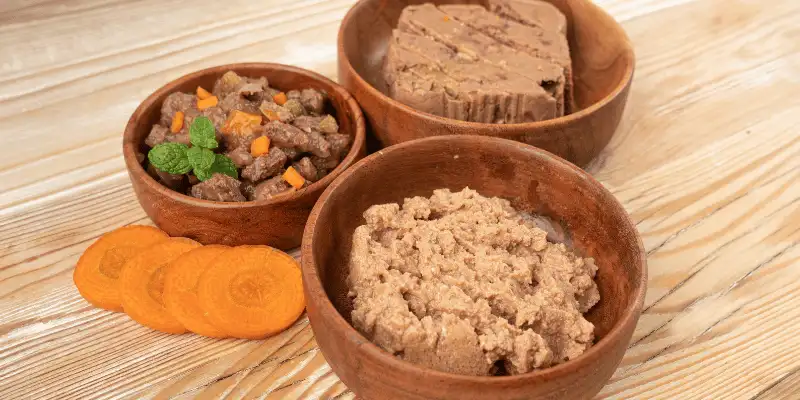Can a Dog Eat Durians? Is Durians Safe for Dogs?
Published: 21 Feb 2025
Can Dogs Eat Durian?
No, dogs cannot eat durians. Durian is rich in sugar and fat, which can upset your dog’s stomach and lead to weight gain or digestive issues. Also, the seeds and rind are dangerous and can cause choking or blockages.
Why Durian is Not Safe for Dogs?
Digestive Distress:
Durian is exceptionally rich in both fat and fibre. While fibre is essential in small amounts, the high concentration of durian can overwhelm a dog’s digestive system, leading to
- Diarrhoea
- Vomiting
- Bloating
- Stomach pain
The high fat content also increases the risk of pancreatitis, a severe inflammation of the pancreas.
Potential Toxicity
Durian contains certain compounds, such as sulfides. Sulfides can cause gastrointestinal distress and oxidative stress in certain animals, resulting in toxicity.
Though direct studies of durian toxicity in dogs are limited, this research underscores the importance of caution when introducing unfamiliar fruits to your pet’s diet. 🐶🍈
Choking Hazard
The large, hard seed in the centre of a durian presents a significant choking hazard for dogs. If swallowed, the seed can also cause a blockage in the intestinal tract. The rinds can cause injuries to the mouth and digestive tract, requiring veterinary intervention, sometimes even surgery.
Weight Management Issues
Durian is high in calories and sugar. Regular consumption can contribute to weight gain, which in turn can lead to a host of other health problems, including:
- Joint issues
- Diabetes
- Heart disease
Even small amounts of durian can contribute to excess calorie intake if given frequently.

It is always best to consult with your veterinarian before introducing any new foods to your dog’s diet. They can provide personalized advice based on your dog’s breed, age, health status, and other factors.
What to Do if Your Dog Eats Durian?
If your dog has eaten durian, the first thing to do is assess the situation. How much did they eat, and how long ago? Are they showing any unusual behavior or symptoms?
- If your dog only consumed a tiny piece of durian and is acting normally, monitor them closely for 24-48 hours. Watch for any signs of digestive upset like vomiting, diarrhoea, or loss of appetite.
- If your dog ate a larger quantity of durian or is exhibiting any concerning symptoms, contact your veterinarian immediately and tell them how much and what part of the durian was consumed.
- Your vet may recommend monitoring at home or bringing your dog in for a checkup.
- Unless advised by a vet, do not try to make your dog vomit, as it can do more harm than good.

This blog post offers general information about durians and dogs. This information should not be considered a substitute for personalized advice from your veterinarian. Always consult with your vet before making any changes to your dog’s diet.
Safe and Healthy Alternatives to Durian
While durian isn’t safe for dogs, plenty of delicious and nutritious alternatives exist! Here are some dog-friendly treats:
- Bananas: These potassium-rich fruits are a great source of vitamins and fibre. Offer small slices as an occasional treat.
- Strawberries: Packed with antioxidants and vitamin C, strawberries can be a delicious and healthy snack. Remove the tops and slice them into appropriate sizes for your dog.
- Apples (without core and seeds): Apples provide vitamins A and C, as well as fibre. Slice them into small pieces, removing the core and seeds, which can be a choking hazard.
- Flaxseeds (ground): Ground flaxseeds are a good source of omega-3 fatty acids, which are beneficial for skin and coat health. Always offer ground flaxseed.
- Amaranth Seeds (cooked): Cooked amaranth seeds can provide fibre and other nutrients. Always cook amaranth seeds before giving them to your dog.
- Sweet Potatoes (cooked): Sweet potatoes provide fibre, vitamins, and minerals. Avoid giving them raw, as it can be difficult for dogs to digest.
By offering safe and nutritious alternatives, you can keep your dog happy, healthy, and free from the risks associated with durian. 🐶🥰
Conclusion: Can Dogs Eat Durians?
Ok, guys, now you have the answers to the question, “Can dogs eat durians?“
Despite its nutritional benefits for humans, durian is not recommended for dogs. The risks—including digestive issues, potential toxicity, choking hazards, and high sugar content—outweigh any potential benefits.
🩺 As a veterinarian, I strongly advise against offering durian to your dog. Instead, stick to safe, dog-friendly fruits, lean proteins, and high-quality commercial treats that support your dog’s health and well-being.
A balanced and appropriate diet is crucial for your dog’s long-term health. Prioritize foods that meet their nutritional needs and avoid potential hazards like durian.
If you have questions about your dog’s diet or want personalized advice, consult with a veterinarian or veterinary nutritionist. They can help create a safe and nutritious meal plan tailored to your furry friend’s specific needs. 🐶💛
FAQs
Let’s discuss some frequently asked questions about dogs and durians.
If your dog eats durian seeds or rind, contact your vet even if your dog appears fine, as seeds can cause dangerous intestinal blockages. Quick action can prevent severe complications.
Symptoms of durian toxicity in dogs can appear within a few hours. Signs of an intestinal blockage may take 24-48 hours to develop, including constipation, bloating, and appetite loss.
No, dogs should never eat durians. Even in small amounts, durian can upset your dog’s stomach due to its high sugar and fat content. It’s safer to stick to dog-friendly fruits.
Durian-based products like ice cream, candy, and pastries are unsafe for dogs due to added sugars, dairy, artificial ingredients, and potentially toxic substances like xylitol. These products can cause digestive issues, obesity, and severe health risks. Always avoid sharing processed durian treats with your dog.
Durian’s risks to dogs are mostly short-term. However, untreated blockages can lead to severe internal damage and chronic conditions like pancreatitis.
Even if your dog seems fine after eating durian, you should still contact your vet. Some symptoms, particularly those related to internal blockages or toxicity, may not appear immediately. A vet can provide guidance on monitoring your dog and recommend whether a visit is necessary.

- Be Respectful
- Stay Relevant
- Stay Positive
- True Feedback
- Encourage Discussion
- Avoid Spamming
- No Fake News
- Don't Copy-Paste
- No Personal Attacks

- Be Respectful
- Stay Relevant
- Stay Positive
- True Feedback
- Encourage Discussion
- Avoid Spamming
- No Fake News
- Don't Copy-Paste
- No Personal Attacks





